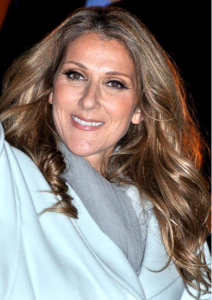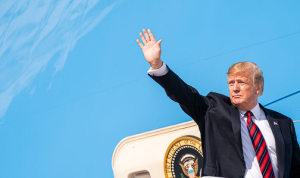In the fast-paced world of politics, where campaign speeches and rally soundtracks dominate the airwaves, one legendary voice has emerged to challenge the status quo. Celine Dion, the iconic singer-songwriter known for her powerful music and captivating stage presence, has drawn a line in the sand by refusing to allow former President Donald Trump to use her music without permission.
At a rally in Montana, Trump and his running mate chose to include an unexpected element in their pre-speech playlist: a video of Celine Dion performing the theme song from the blockbuster film “Titanic,” “My Heart Will Go On.” While some may see this choice as a nod to Dion’s ongoing appeal and the emotional intensity of her music, Dion and her management team saw it as a blatant disregard for her artistic integrity and a violation of her intellectual property rights.

Shortly after the gathering, Dion’s team issued a statement making it clear that Trump did not have authorization to use her music in his political campaign. They also posed a pointed question: Why did Trump choose this specific song? Dion’s response to the unauthorized use of her song was swift and unwavering. She emphasized that she would not tolerate the use of her work for political purposes.
Taking a bold stance, Dion announced that the usage of “My Heart Will Go On” would be discontinued, sending a clear message to Trump and his team that they had crossed a line. This courageous step not only showcased Dion’s unwavering commitment to protecting her artistic legacy, but also shed light on the larger issue of politicians using copyrighted material without permission.
Dion’s protest against Trump’s unlawful use of her music is part of a larger movement where celebrities and public figures are asserting their rights and refusing to be exploited as political puppets. Many artists, musicians, and Hollywood stars have spoken out against politicians and campaigns using their work without permission. The Rolling Stones demanded that Trump cease using their songs, while Rihanna called out the former president for playing her music at a rally. The message is clear: celebrities will not allow their work to be used for political gain without consent.

This trend reflects a broader shift in our cultural landscape, where the lines between entertainment, fame, and politics have become increasingly blurred. As audiences become more discerning and aware of the power dynamics at play, the demand for authenticity and artistic integrity grows stronger.
Navigating the intersection of politics and pop culture can be a delicate and often controversial affair, as demonstrated by Celine Dion’s dispute with Donald Trump. Political candidates must strike a balance between respecting artists’ intellectual property rights and connecting with the larger cultural zeitgeist to engage with their constituents effectively.





